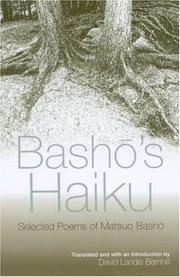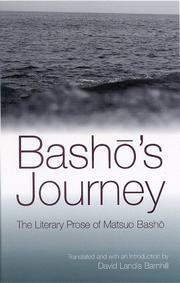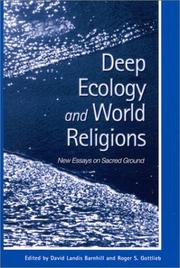| Listing 1 - 4 of 4 |
Sort by
|

ISBN: 0791484653 1423740017 9781423740018 9780791461655 0791461653 9780791461662 0791461661 9780791484654 Year: 2004 Publisher: Albany State University of New York Press
Abstract | Keywords | Export | Availability | Bookmark
 Loading...
Loading...Choose an application
- Reference Manager
- EndNote
- RefWorks (Direct export to RefWorks)
2005 CHOICE Outstanding Academic TitleBasho's Haiku offers the most comprehensive translation yet of the poetry of Japanese writer Matsuo Bashō (1644–1694), who is credited with perfecting and popularizing the haiku form of poetry. One of the most widely read Japanese writers, both within his own country and worldwide, Bashō is especially beloved by those who appreciate nature and those who practice Zen Buddhism. Born into the samurai class, Bashō rejected that world after the death of his master and became a wandering poet and teacher. During his travels across Japan, he became a lay Zen monk and studied history and classical poetry. His poems contained a mystical quality and expressed universal themes through simple images from the natural world.David Landis Barnhill's brilliant book strives for literal translations of Bashō's work, arranged chronologically in order to show Bashō's development as a writer. Avoiding wordy and explanatory translations, Barnhill captures the brevity and vitality of the original Japanese, letting the images suggest the depth of meaning involved. Barnhill also presents an overview of haiku poetry and analyzes the significance of nature in this literary form, while suggesting the importance of Bashō to contemporary American literature and environmental thought.
Japanese poetry --- Haiku --- Japanese poetry (Collections) --- Japanese literature --- Translations into English.

ISBN: 0791483436 1423743571 9781423743576 079146413X 9780791464137 0791464148 9780791464144 9780791483435 Year: 2005 Publisher: New York, N.Y. State University of New York Press
Abstract | Keywords | Export | Availability | Bookmark
 Loading...
Loading...Choose an application
- Reference Manager
- EndNote
- RefWorks (Direct export to RefWorks)
In Bashō's Journey, David Landis Barnhill provides the definitive translation of Matsuo Bashō's literary prose, as well as a companion piece to his previous translation, Bashō's Haiku. One of the world's greatest nature writers, Bashō (1644–1694) is well known for his subtle sensitivity to the natural world, and his writings have influenced contemporary American environmental writers such as Gretel Ehrlich, John Elder, and Gary Snyder. This volume concentrates on Bashō's travel journal, literary diary (Saga Diary), and haibun. The premiere form of literary prose in medieval Japan, the travel journal described the uncertainty and occasional humor of traveling, appreciations of nature, and encounters with areas rich in cultural history. Haiku poetry often accompanied the prose. The literary diary also had a long history, with a format similar to the travel journal but with a focus on the place where the poet was living. Bashō was the first master of haibun, short poetic prose sketches that usually included haiku.As he did in Bashō's Haiku, Barnhill arranges the work chronologically in order to show Bashō's development as a writer. These accessible translations capture the spirit of the original Japanese prose, permitting the nature images to hint at the deeper meaning in the work. Barnhill's introduction presents an overview of Bashō's prose and discusses the significance of nature in this literary form, while also noting Bashō's significance to contemporary American literature and environmental thought. Excellent notes clearly annotate the translations.
Authors, Japanese, --- Japanese authors --- Travel. --- Matsuo, Bashō, --- Matsuo, Bashō --- Bashō, Matsuo --- Travel --- Japan --- Description and travel --- Authors, Japanese --- 松尾, 芭蕉 --- Matsuo, Basho,
Book
ISBN: 0791491056 Year: 2001 Publisher: Albany : State University of New York Press,
Abstract | Keywords | Export | Availability | Bookmark
 Loading...
Loading...Choose an application
- Reference Manager
- EndNote
- RefWorks (Direct export to RefWorks)
Parallels and contrasts values from world religions and those proposed by the environmental perspective of deep ecology.
Deep ecology --- Religions. --- Religious aspects.

ISBN: 0791448835 9780791448830 0791448843 9780791491058 Year: 2001 Publisher: Albany, NY State University of New York Press
Abstract | Keywords | Export | Availability | Bookmark
 Loading...
Loading...Choose an application
- Reference Manager
- EndNote
- RefWorks (Direct export to RefWorks)
world religions --- deep ecology --- the relationship between traditional world spirituality and the contemporary environmental perspective of deep ecology --- indigenous cultures --- Hinduism --- Buddhism --- Taoism --- Confucianism --- Judaism --- Catholicism --- Islam --- Protestantism --- Christian ecofeminism --- New Age spirituality
| Listing 1 - 4 of 4 |
Sort by
|

 Search
Search Feedback
Feedback About UniCat
About UniCat  Help
Help News
News